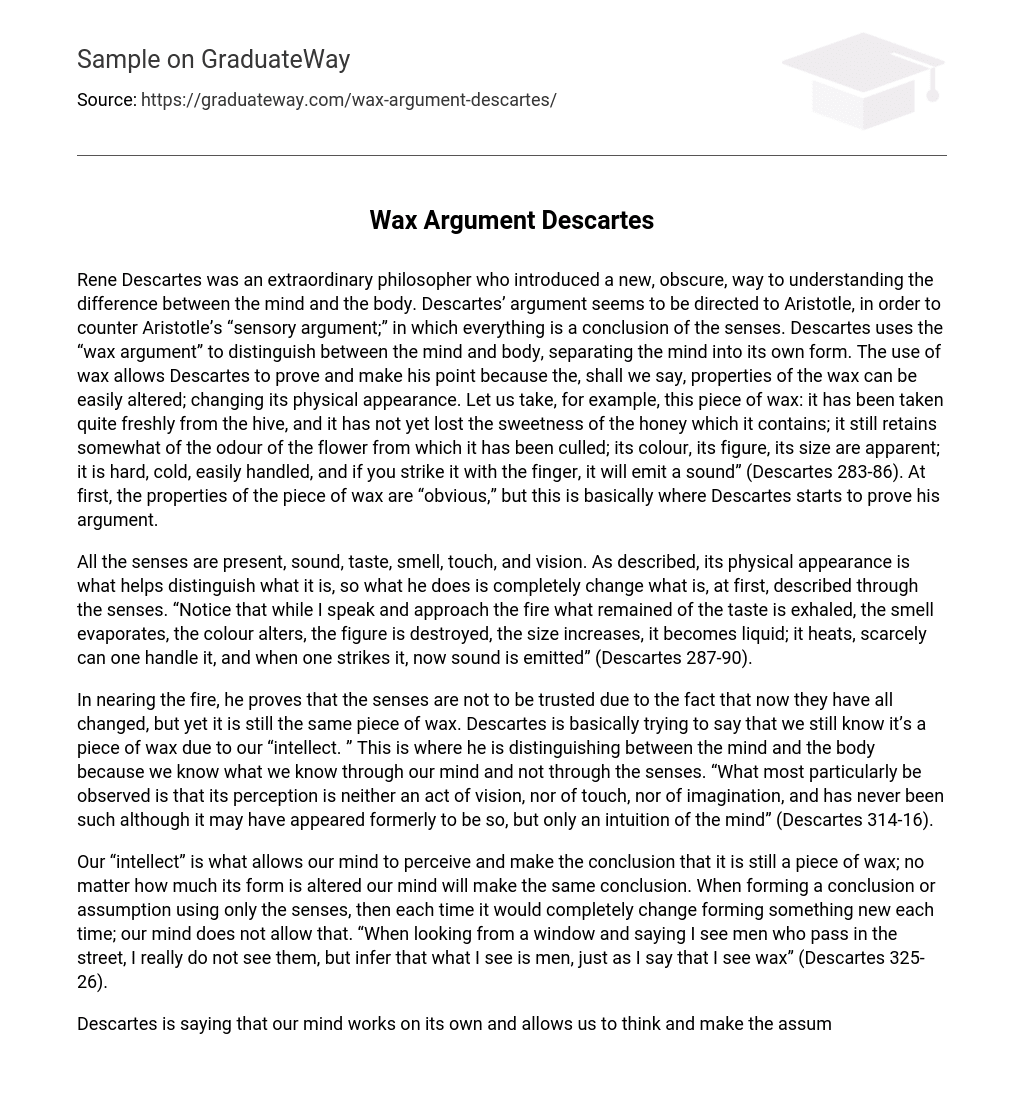Rene Descartes, a notable philosopher, introduced an innovative and cryptic method of understanding the difference between the mind and the body. Descartes’ aim appears to be challenging Aristotle’s “sensory argument,” which posits that all perception is through the senses. To separate the mind from the body, Descartes employs the “wax argument” wherein he demonstrates how easily the properties of wax can change, thereby proving the existence of a distinct mind. As Descartes explains, a freshly taken piece of wax still maintains its floral scent, exhibits physical characteristics like color and size, and produces sound when struck (Descartes 283-86). Initially, these attributes may seem evident but this is where Descartes begins providing support for his argument.
According to Descartes, an object’s physical appearance helps identify it through the senses – sound, taste, smell, touch, and vision. However, in the case mentioned by Descartes, the subject undergoes a complete transformation from its initial perception. As Descartes explains when he moves closer to the fire:
- The taste dissipates
- The smell vanishes
- The color alters
- The shape is distorted or destroyed entirely
- Its size becomes larger and it transforms into a liquid state
In addition, it becomes hot and difficult to handle. When struck against something else, it produces sound (Descartes 287-90).
Descartes argues that the senses cannot be trusted because they change when the object, such as wax, is brought near the fire. However, despite the changes, we still recognize it as the same piece of wax based on our intellect. This distinction between the mind and the body is crucial because our knowledge is acquired through the mind rather than the senses. As Descartes states, the perception of the wax is not a result of vision, touch, or imagination, but only an intuition of the mind (Descartes 314-16).
Our “intellect” enables our mind to perceive and reach the conclusion that the wax remains the same, despite any changes in its form. Our mind consistently arrives at this conclusion, even if our senses might suggest otherwise. Descartes explains that when we look out a window and claim to see men passing in the street, we do not actually see them directly, but rather infer their presence based on what we observe, similar to how we perceive the wax’s attributes (Descartes 325-26).
According to Descartes, our mind has the ability to think and reason independently of our senses. He believes that our mind can draw conclusions regardless of the information we receive through our senses. This cognitive process allows for the continuous growth of knowledge based on what we already know. Descartes asserts that he cannot perceive things without a human mind. However, instead of focusing on their separation, it would have been more beneficial for Descartes to examine how the mind and body rely on each other.
Descartes posited that the human mind possesses an exceptional ability to perceive and acquire knowledge, a notion that I concur with regarding the significance of the mind in our comprehension. Nevertheless, I firmly maintain that our senses also play a critical role in shaping our understanding. Our senses serve as a fundamental structure for the development of our mind, and without them, maneuvering through everyday life would prove challenging.
Human beings rely on various sensory abilities such as sight, smell, hearing, taste, and touch to perceive the world around them. Without these senses, we would lack the ability to think and reason effectively, rendering us similar to lifeless objects. Each sense plays a distinct role in our understanding of reality. If any of these senses were lost, we would become isolated within our own imagination and lose connection with the actual world. Our conscious awareness serves as evidence of our existence as we navigate through life’s experiences – much like how a piece of wax paper has its physical presence.
Descartes understood that regardless of any changes made to the wax, our mind would consistently perceive it in the same way. However, he questioned how he initially identified it as wax. He utilized his senses to establish a fundamental understanding of its nature. The wax retained its essence as wax despite any actions or statements made about it. Presently, science relies on our observations and experiments, and I firmly assert that our senses are equally important as our thought process; they function in unison.





